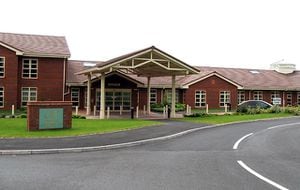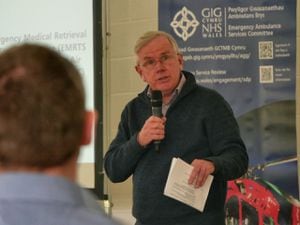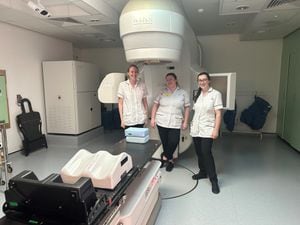More people now dying in their own home in Shropshire
Dying at home is becoming more common in Shropshire, according to official figures – leading to calls for more funding to support the work of hospices, both in people's homes and at their dedicated centres.

The latest data from Public Health England reveals that about 21 per cent of the deaths registered in Telford & Wrekin in 2017 occurred at home, and 22 per cent in the Shropshire Council area.
The Shropshire figure is an increase on 20 per cent five years earlier.
The data identifies the four most common places of death in the county as hospitals, care homes, hospices and homes – although deaths at home are often supported by outreach services from hospices.
The largest percentage of deaths in the county still take place in hospitals – unsurprisingly accounting for around 45 per cent in total in 2017.
In Telford about 21 per cent of deaths occurred at care home facilities while nine per cent were at hospices.
For Shropshire 22 per cent were at care homes and six per cent at hospices.
A recent study carried out by King's College London found that most people prefer to die in the place they are usually cared for, including home, rather than in a hospital.
Anna Bone, lead author of the study said it highlighted the need to invest in community health services – such as hospice facilities.
She said: “The projected rise of deaths in care homes is striking and warns of the urgent need to ensure adequate bed capacity, resources and training of staff in palliative care in all care homes in the country.
“If we are to continue enabling people to die in their preferred place, it is essential to invest more in care homes and community health services.
"Without this investment, people are likely to seek help from hospitals, which puts pressure on an already strained system and is not where people would rather be at the end of their lives”.
Heather Palin, chief executive of Severn Hospice, which has centres at Shrewsbury and Telford, said the demand for their services – be it in peoples homes or at their dedicated bases – will only increase in future.
She said: “The report shows that people in Shropshire and Telford & Wrekin have better access to a hospice bed than the national average.
Specialist
"This is a good thing as most of us will be receiving clinical support of some kind when we reach the end of our life, and this will become increasingly the case. Hospices exist precisely to support this changing demand and because they are able to provide specialist palliative care in a way that is simply not possible in a hospital setting.
“It is also increasingly the case that hospices provide their care in people’s homes. Four out of five people looked after by Severn Hospice are cared for at home and the report will absolutely include some of our patients in the figures for the numbers of people dying at home.
"We are expanding and enhancing our community services – our Outreach and Hospice at Home nursing teams and our day services – so we are keeping pace with changes in patient needs.
"There will always be a need for wards but we are investing in new buildings, facilities and services so we are able to provide the care our community now needs.
“I see the report as confirming that there is so much demand for hospice care, wherever it is needed, and that having that care available has become more important than ever.
"We have to raise £2 for every £3 we spend on providing our care, and it costs more than £11 million a year to run our whole operation.
"Severn Hospice could not provide any care at all without the financial support of the community it serves and the clinical commissioning groups and health boards who also fund us so I also see the report in the context of the need for continued future funding.”
On average, 46 per cent of deaths registered in England in 2017 took place in hospitals. Home was the second most common place to die, with 24 per cent of the total.
Similar to Shropshire care homes were the location of 22 per cent of deaths, followed by hospices, with just six per cent.
Matthew Reed, chief executive at the terminal illness charity Marie Curie, said: "For those patients at the end of their lives, hospices provide vital, person-centred care and support families before and after their loved one has died.
"In the absence of more hospice capacity being funded we would expect the number of deaths in hospices to remain constant.
"But we know that the total number of people dying will increase significantly over the next decade and much needs to be done to ensure that this doesn’t mean many more people dying unnecessarily in overcrowded hospitals."





